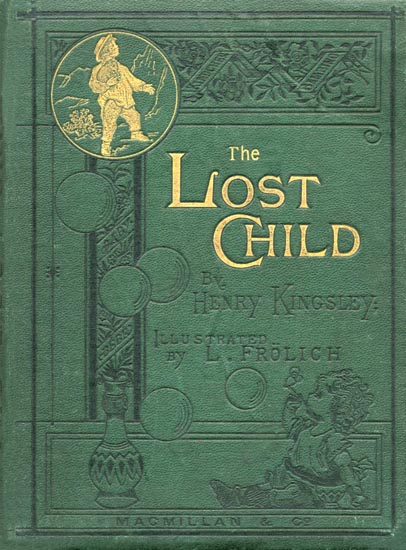
The Project Gutenberg EBook of The Lost Child, by Henry Kingsley This eBook is for the use of anyone anywhere at no cost and with almost no restrictions whatsoever. You may copy it, give it away or re-use it under the terms of the Project Gutenberg License included with this eBook or online at www.gutenberg.org Title: The Lost Child Author: Henry Kingsley Release Date: May 9, 2008 [EBook #25404] Language: English Character set encoding: ISO-8859-1 *** START OF THIS PROJECT GUTENBERG EBOOK THE LOST CHILD *** Produced by Marilynda Fraser-Cunliffe and the Online Distributed Proofreading Team at http://www.pgdp.net (This file was made using scans of public domain works in the International Children's Digital Library.)

London and New York:
MACMILLAN AND CO.
1871.
It is only natural that an author should say a few words about a republication of this kind. The story in its separate form has the advantage of being illustrated by an eminent artist, whose special qualifications are widely known and acknowledged; and it seemed to all concerned best that it should be left entirely untouched. The first two paragraphs and the last short one are simply added: no other liberty has been taken with it.
To avoid the trouble of those great plagues of literature, foot-notes, the author asks the reader to submit to a few very trifling explanations:
"Quantongs" are a bush fruit, of about the same quality as green gooseberries, but, like the last-named fruit, very much sought after by the native youth.
The Bunyip is the native river devil, or kelpie, evidently the crocodile of the Northern Australian rivers, whose recognition by the Southern natives in their legends shows, if nothing else did, that the centre of dispersion in Australia was from the North, as Doctor Laing told us years ago.
With regard to the habit which lost children have of aimless climbing, the author knew a child who, being lost by his father while out shooting on one of the flats bordering on the Eastern Pyrenees in Port Phillip on Sunday afternoon, was found the next Wednesday dead, at an elevation [Pg 9]above the Avoca township of between two and three thousand feet.
| PAGE | |
| Sometimes looking eagerly across the water at the waving forest boughs | Front. |
| And there he stood, naked and free, on the forbidden ground | Vignette. |
| "Mother, what country is that across the river?" | 15 |
| A Kangaroo! A Snake! An Eagle! | 21 |
| He was lost in the bush | 25 |
| He came on the bald, thunder-smitten summit ridge | 29 |
| "We have come to help you, mistress" | 33 |
| There he lay, dead and stiff | 39 |
Remember? Yes, I remember well that time when the disagreement arose between Sam Buckley and Cecil, and how it was mended. You are wrong about one thing, General; no words ever passed between those two young men: death was between them before they had time to speak.
I will tell you the real story, old as I am, as well as either of them could tell it for themselves; and as I tell it I hear the familiar roar of the old snowy river in my ears, and if I shut my eyes I can see the great mountain, Lanyngerin, bending down his head like a thorough-bred horse with a curb[Pg 12] in his mouth; I can see the long grey plains, broken with the outlines of the solitary volcanoes Widderin and Monmot. Ah, General Halbert! I will go back there next year, for I am tired of England, and I will leave my bones there; I am getting old, and I want peace, as I had it in Australia. As for the story you speak of, it is simply this:—
Four or five miles up the river from Garoopna stood a solitary hut, sheltered by a lofty bare knoll, round which the great river chafed among the boulders. Across the stream was the forest sloping down in pleasant glades from the mountain; and behind the hut rose the plain four or five hundred feet overhead, seeming to be held aloft by the blue-stone columns which rose from the river-side.[Pg 13]
In this cottage resided a shepherd, his wife, and one little boy, their son, about eight years old,—a strange, wild little bush child, able to speak articulately, but utterly without knowledge or experience of human creatures, save of his father and mother; unable to read a line; without religion of any sort or kind; as entire a little savage, in fact, as you could find in the worst den in your city, morally speaking, and yet beautiful to look on; as active as a roe, and, with regard to natural objects, as fearless as a lion.
As yet unfit to begin labour; all the long summer he would wander about the river bank, up and down the beautiful rock-walled paradise where he was confined, sometimes looking eagerly across the water at the waving forest boughs, and fancying he could[Pg 14] see other children far up the vistas beckoning to him to cross and play in that merry land of shifting lights and shadows.
It grew quite into a passion with the poor little man to get across and play there; and one day when his mother was shifting the hurdles, and he was handing her the strips of green hide which bound them together, he said to her,—
"Mother, what country is that across the river?"
"The forest, child."
"There's plenty of quantongs over there, eh, mother, and raspberries? Why mayn't I get across and play there?"
"The river is too deep, child, and the Bunyip lives in the water under the stones."[Pg 15]
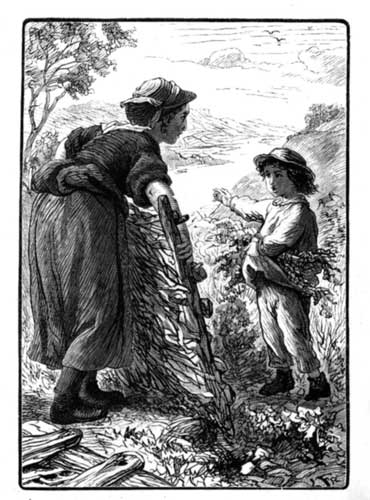 "Mother, what country is that across the river?"
"Mother, what country is that across the river?"
"Who are the children that play across there?"
"Black children, likely."
"No white children?"
"Pixies; don't go near 'em, child; they'll lure you on, Lord knows where. Don't get trying to cross the river, now, or you'll be drowned."
But next day the passion was stronger on him than ever. Quite early on the glorious cloudless midsummer day he was down by the river-side, sitting on a rock, with his shoes and stockings off, paddling his feet in the clear tepid water, and watching the million fish in the shallows—black fish and grayling—leaping and flashing in the sun.
There is no pleasure that I have ever experienced like a child's midsummer holiday,—the time, I mean, when two[Pg 18] or three of us used to go away up the brook, and take our dinners with us, and come home at night tired, dirty, happy, scratched beyond recognition, with a great nosegay, three little trout and one shoe, the other having been used for a boat till it had gone down with all hands out of soundings. How poor our Derby days, our Greenwich dinners, our evening parties, where there are plenty of nice girls, are, after that! Depend on it, a man never experiences such pleasure or grief after fourteen as he does before: unless in some cases in his first love-making, when the sensation is new to him.
But, meanwhile, there sat our child, barelegged, watching the forbidden ground beyond the river. A fresh breeze was moving the trees, and making the whole a dazzling mass of[Pg 19] shifting light and shadow. He sat so still that a glorious violet and red kingfisher perched quite close, and, dashing into the water, came forth with a fish, and fled like a ray of light along the winding of the river. A colony of little shell parrots, too, crowded on a bough, and twittered and ran to and fro quite busily, as though they said to him, "We don't mind you, my dear; you are quite one of us."
Never was the river so low. He stepped in; it scarcely reached his ankle. Now surely he might get across. He stripped himself, and, carrying his clothes, waded through, the water never reaching his middle, all across the long, yellow gravelly shallow. And there he stood, naked and free, on the forbidden ground.[Pg 20]
He quickly dressed himself, and began examining his new kingdom, rich beyond his utmost hopes. Such quantongs, such raspberries, surpassing imagination; and when tired of them, such fern boughs, six or eight feet long! He would penetrate this region, and see how far it extended.[Pg 21]
What tales he would have for his father to-night! He would bring him here, and show him all the wonders, and perhaps he would build a new hut over here, and come and live in it? Perhaps the pretty young lady, with the feathers in her hat, lived somewhere here, too?[Pg 22]
There! There is one of those children he has seen before across the river. Ah! ah! it is not a child at all, but a pretty grey beast, with big ears. A kangaroo, my lad; he won't[Pg 23] play with you, but skips away slowly, and leaves you alone.
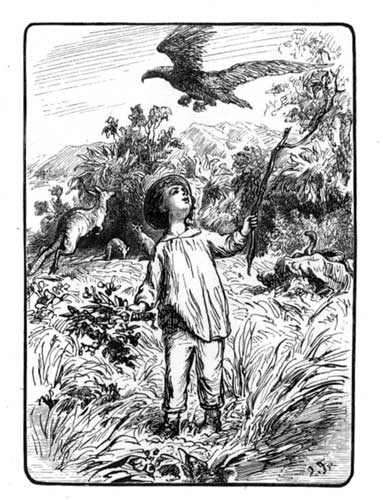 "A Kangaroo! A Snake! An Eagle!"
"A Kangaroo! A Snake! An Eagle!"
There is something like the gleam of water on that rock. A snake! Now a sounding rush through the wood, and a passing shadow. An eagle! He brushes so close to the child, that he strikes at the bird with a stick, and then watches him as he shoots up like a rocket, and, measuring the fields of air in ever-widening circles, hangs like a motionless speck upon the sky; though, measure his wings across, and you will find he is nearer fifteen feet than fourteen.
Here is a prize, though! A wee little native bear, barely a foot long,—a little grey beast, comical beyond expression, with broad flapped ears,—sits on a tree within reach. He makes no resistance, but cuddles into[Pg 24] the child's bosom, and eats a leaf as they go along; while his mother sits aloft, and grunts indignant at the abstraction of her offspring, but, on the whole, takes it pretty comfortably, and goes on with her dinner of peppermint leaves.
What a short day it has been! Here is the sun getting low, and the magpies and jackasses beginning to tune up before roosting.
He would turn and go back to the river. Alas! which way?
He was lost in the bush. He turned back and went, as he thought, the way he had come, but soon arrived at a tall, precipitous cliff, which, by some infernal magic, seemed to have got between him and the river. Then he broke down, and that strange madness came on him which comes even[Pg 27] on strong men when lost in the forest; a despair, a confusion of intellect, which has cost many a man his life. Think what it must be with a child!
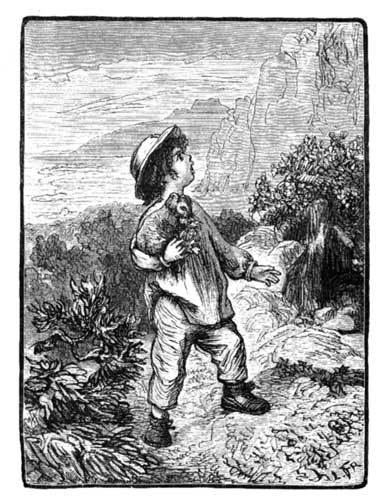 He was lost in the Bush.
He was lost in the Bush.
He was fully persuaded that the cliff was between him and home, and that he must climb it. Alas! every step he took aloft carried him further from the river and the hope of safety; and when he came to the top, just at dark, he saw nothing but cliff after cliff, range after range, all around him. He had been wandering through steep gullies all day unconsciously, and had penetrated far into the mountains. Night was coming down, still and crystal clear, and the poor little lad was far away from help or hope, going his last long journey alone.
Partly perhaps walking, and partly sitting down and weeping, he got through the night; and when the solemn morning came up, again he was still tottering along the leading range, bewildered; crying, from time to time, "Mother, mother!" still nursing his little bear, his only companion, to his bosom, and holding still in his hand a few poor flowers he had gathered the day before. Up and on all day, and at evening, passing out of the great zone of timber, he came on the bald, thunder-smitten summit ridge, where one ruined tree held up its skeleton arms against the sunset, and the wind came keen and frosty. So, with failing, feeble legs, upward still, towards the region of the granite and the snow; towards the eyrie of the kite and the eagle.
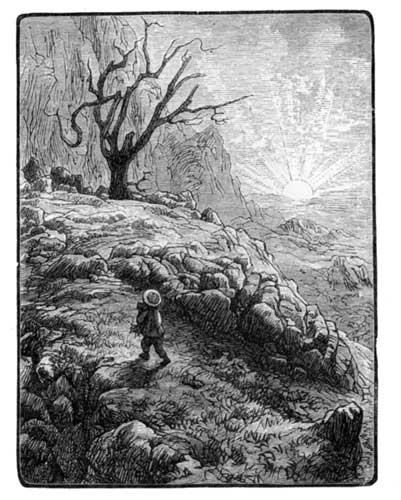 He came on the bald, thunder-smitten summit ridge.
He came on the bald, thunder-smitten summit ridge.
Brisk as they all were at Garoopna, none were so brisk as Cecil and Sam. Charles Hawker wanted to come with them, but Sam asked him to go with Jim; and, long before the others were ready, our two had strapped their blankets to their saddles, and followed by Sam's dog Rover, now getting a little grey about the nose, cantered off up the river.
Neither spoke at first. They knew what a solemn task they had before them; and, while acting as though everything depended on speed, guessed well that their search was only for a little corpse, which, if they had luck, they would find stiff and cold under some tree or cray.
Cecil began: "Sam, depend on it that child has crossed the river to this side. If he had been on the plains,[Pg 32] he would have been seen from a distance in a few hours."
"I quite agree," said Sam. "Let us go down on this side till we are opposite the hut, and search for marks by the river-side."
So they agreed; and in half an hour were opposite the hut, and, riding across to it to ask a few questions, found the poor mother sitting on the door-step, with her apron over her head, rocking herself to and fro.
"We have come to help you, mistress," said Sam. "How do you think he is gone?"
She said, with frequent bursts of grief, that "some days before he had mentioned having seen white children across the water, who beckoned him to cross and play; that she, knowing well that they were fairies, or perhaps[Pg 33] worse, had warned him solemnly not to mind them; but that she had very little doubt that they had helped him over and carried him away to the forest; and that her husband would not believe in his having crossed the river."
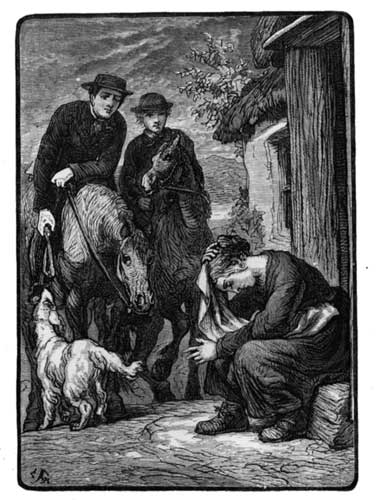 "We have come to help you, Mistress."
"We have come to help you, Mistress."
[Pg 35]"Why, it is not knee-deep across the shallow," said Cecil.
"Let us cross again," said Sam: "he may be drowned, but I don't think it."
In a quarter of an hour from starting they found, slightly up the stream, one of the child's socks, which in his hurry to dress he had forgotten. Here brave Rover took up the trail like a bloodhound, and before evening stopped at the foot of a lofty cliff.
"Can he have gone up here?" said Sam, as they were brought up by the rock.
"Most likely," said Cecil. "Lost[Pg 36] children always climb from height to height. I have heard it often remarked by old bush hands. Why they do so, God, who leads them, only knows; but the fact is beyond denial. Ask Rover what he thinks?"
The brave old dog was half-way up, looking back for them. It took them nearly till dark to get their horses up; and, as there was no moon, and the way was getting perilous, they determined to camp, and start again in the morning.
They spread their blankets and lay down side by side. Sam had thought, from Cecil's proposing to come with him in preference to the others, that he would speak of a subject nearly concerning them both; but Cecil went off to sleep and made no sign; and Sam, ere he dozed, said to himself,[Pg 37] "If he don't speak this journey, I will. It is unbearable that we should not come to some understanding. Poor Cecil!"
At early dawn they caught up their horses, which had been hobbled with the stirrup leathers, and started afresh. Both were more silent than ever, and the dog, with his nose to the ground, led them slowly along the rocky rib of the mountain, ever going higher and higher.
"It is inconceivable," said Sam, "that the poor child can have come up here. There is Tuckerimbid close to our right, five thousand feet above the river. Don't you think we must be mistaken?"
"The dog disagrees with you," said Cecil. "He has something before him not very far off. Watch him."[Pg 38]
The trees had become dwarfed and scattered; they were getting out of the region of trees; the real forest zone was now below them, and they saw they were emerging towards a bald elevated down, and that a few hundred yards before them was a dead tree, on the highest branch of which sat an eagle.
"The dog has stopped," said Cecil; "the end is near."
"See," said Sam, "there is a hand-kerchief under the tree."
"That is the boy himself," said Cecil.
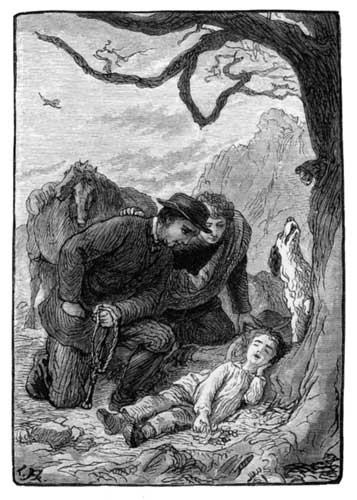 There he lay, dead and stiff.
There he lay, dead and stiff.
They were up to him and off in a moment. There he lay, dead and stiff, one hand still grasping the flowers he had gathered on his last happy play-day, and the other laid as a pillow, between the soft cold cheek and the[Pg 41] rough cold stone. His midsummer holiday was over, his long journey was ended. He had found out at last what lay beyond the shining river he had watched so long.
That is the whole story, General Halbert; and who should know it better than I, Geoffry Hamlyn?
Pictured in Twenty Plates, and Narrated
Author of "The Heir of Redclyffe."
Crown 4to. cloth gilt.
With Eight Illustrations.
Crown 4to. cloth gilt.
Told in Twelve Pictures, with Rhymes
Crown 4to. cloth gilt.
Gathered and Narrated anew
Author of "The Heir of Redclyffe."
With Twenty Illustrations. Crown 8vo. cloth gilt.
STORIES FOR CHILDREN.
With Eight Illustrations. Second Edition.
Extra Fcap. 8vo. 4s. 6d.
Uniform with the above.
With Eight Illustrations.
MACMILLAN AND CO., LONDON.
LONDON:
R. CLAY, SONS, AND TAYLOR,
PRINTERS, BREAD STREET HILL.
End of the Project Gutenberg EBook of The Lost Child, by Henry Kingsley
*** END OF THIS PROJECT GUTENBERG EBOOK THE LOST CHILD ***
***** This file should be named 25404-h.htm or 25404-h.zip *****
This and all associated files of various formats will be found in:
http://www.gutenberg.org/2/5/4/0/25404/
Produced by Marilynda Fraser-Cunliffe and the Online
Distributed Proofreading Team at http://www.pgdp.net (This
file was made using scans of public domain works in the
International Children's Digital Library.)
Updated editions will replace the previous one--the old editions
will be renamed.
Creating the works from public domain print editions means that no
one owns a United States copyright in these works, so the Foundation
(and you!) can copy and distribute it in the United States without
permission and without paying copyright royalties. Special rules,
set forth in the General Terms of Use part of this license, apply to
copying and distributing Project Gutenberg-tm electronic works to
protect the PROJECT GUTENBERG-tm concept and trademark. Project
Gutenberg is a registered trademark, and may not be used if you
charge for the eBooks, unless you receive specific permission. If you
do not charge anything for copies of this eBook, complying with the
rules is very easy. You may use this eBook for nearly any purpose
such as creation of derivative works, reports, performances and
research. They may be modified and printed and given away--you may do
practically ANYTHING with public domain eBooks. Redistribution is
subject to the trademark license, especially commercial
redistribution.
*** START: FULL LICENSE ***
THE FULL PROJECT GUTENBERG LICENSE
PLEASE READ THIS BEFORE YOU DISTRIBUTE OR USE THIS WORK
To protect the Project Gutenberg-tm mission of promoting the free
distribution of electronic works, by using or distributing this work
(or any other work associated in any way with the phrase "Project
Gutenberg"), you agree to comply with all the terms of the Full Project
Gutenberg-tm License (available with this file or online at
http://gutenberg.org/license).
Section 1. General Terms of Use and Redistributing Project Gutenberg-tm
electronic works
1.A. By reading or using any part of this Project Gutenberg-tm
electronic work, you indicate that you have read, understand, agree to
and accept all the terms of this license and intellectual property
(trademark/copyright) agreement. If you do not agree to abide by all
the terms of this agreement, you must cease using and return or destroy
all copies of Project Gutenberg-tm electronic works in your possession.
If you paid a fee for obtaining a copy of or access to a Project
Gutenberg-tm electronic work and you do not agree to be bound by the
terms of this agreement, you may obtain a refund from the person or
entity to whom you paid the fee as set forth in paragraph 1.E.8.
1.B. "Project Gutenberg" is a registered trademark. It may only be
used on or associated in any way with an electronic work by people who
agree to be bound by the terms of this agreement. There are a few
things that you can do with most Project Gutenberg-tm electronic works
even without complying with the full terms of this agreement. See
paragraph 1.C below. There are a lot of things you can do with Project
Gutenberg-tm electronic works if you follow the terms of this agreement
and help preserve free future access to Project Gutenberg-tm electronic
works. See paragraph 1.E below.
1.C. The Project Gutenberg Literary Archive Foundation ("the Foundation"
or PGLAF), owns a compilation copyright in the collection of Project
Gutenberg-tm electronic works. Nearly all the individual works in the
collection are in the public domain in the United States. If an
individual work is in the public domain in the United States and you are
located in the United States, we do not claim a right to prevent you from
copying, distributing, performing, displaying or creating derivative
works based on the work as long as all references to Project Gutenberg
are removed. Of course, we hope that you will support the Project
Gutenberg-tm mission of promoting free access to electronic works by
freely sharing Project Gutenberg-tm works in compliance with the terms of
this agreement for keeping the Project Gutenberg-tm name associated with
the work. You can easily comply with the terms of this agreement by
keeping this work in the same format with its attached full Project
Gutenberg-tm License when you share it without charge with others.
1.D. The copyright laws of the place where you are located also govern
what you can do with this work. Copyright laws in most countries are in
a constant state of change. If you are outside the United States, check
the laws of your country in addition to the terms of this agreement
before downloading, copying, displaying, performing, distributing or
creating derivative works based on this work or any other Project
Gutenberg-tm work. The Foundation makes no representations concerning
the copyright status of any work in any country outside the United
States.
1.E. Unless you have removed all references to Project Gutenberg:
1.E.1. The following sentence, with active links to, or other immediate
access to, the full Project Gutenberg-tm License must appear prominently
whenever any copy of a Project Gutenberg-tm work (any work on which the
phrase "Project Gutenberg" appears, or with which the phrase "Project
Gutenberg" is associated) is accessed, displayed, performed, viewed,
copied or distributed:
This eBook is for the use of anyone anywhere at no cost and with
almost no restrictions whatsoever. You may copy it, give it away or
re-use it under the terms of the Project Gutenberg License included
with this eBook or online at www.gutenberg.org
1.E.2. If an individual Project Gutenberg-tm electronic work is derived
from the public domain (does not contain a notice indicating that it is
posted with permission of the copyright holder), the work can be copied
and distributed to anyone in the United States without paying any fees
or charges. If you are redistributing or providing access to a work
with the phrase "Project Gutenberg" associated with or appearing on the
work, you must comply either with the requirements of paragraphs 1.E.1
through 1.E.7 or obtain permission for the use of the work and the
Project Gutenberg-tm trademark as set forth in paragraphs 1.E.8 or
1.E.9.
1.E.3. If an individual Project Gutenberg-tm electronic work is posted
with the permission of the copyright holder, your use and distribution
must comply with both paragraphs 1.E.1 through 1.E.7 and any additional
terms imposed by the copyright holder. Additional terms will be linked
to the Project Gutenberg-tm License for all works posted with the
permission of the copyright holder found at the beginning of this work.
1.E.4. Do not unlink or detach or remove the full Project Gutenberg-tm
License terms from this work, or any files containing a part of this
work or any other work associated with Project Gutenberg-tm.
1.E.5. Do not copy, display, perform, distribute or redistribute this
electronic work, or any part of this electronic work, without
prominently displaying the sentence set forth in paragraph 1.E.1 with
active links or immediate access to the full terms of the Project
Gutenberg-tm License.
1.E.6. You may convert to and distribute this work in any binary,
compressed, marked up, nonproprietary or proprietary form, including any
word processing or hypertext form. However, if you provide access to or
distribute copies of a Project Gutenberg-tm work in a format other than
"Plain Vanilla ASCII" or other format used in the official version
posted on the official Project Gutenberg-tm web site (www.gutenberg.org),
you must, at no additional cost, fee or expense to the user, provide a
copy, a means of exporting a copy, or a means of obtaining a copy upon
request, of the work in its original "Plain Vanilla ASCII" or other
form. Any alternate format must include the full Project Gutenberg-tm
License as specified in paragraph 1.E.1.
1.E.7. Do not charge a fee for access to, viewing, displaying,
performing, copying or distributing any Project Gutenberg-tm works
unless you comply with paragraph 1.E.8 or 1.E.9.
1.E.8. You may charge a reasonable fee for copies of or providing
access to or distributing Project Gutenberg-tm electronic works provided
that
- You pay a royalty fee of 20% of the gross profits you derive from
the use of Project Gutenberg-tm works calculated using the method
you already use to calculate your applicable taxes. The fee is
owed to the owner of the Project Gutenberg-tm trademark, but he
has agreed to donate royalties under this paragraph to the
Project Gutenberg Literary Archive Foundation. Royalty payments
must be paid within 60 days following each date on which you
prepare (or are legally required to prepare) your periodic tax
returns. Royalty payments should be clearly marked as such and
sent to the Project Gutenberg Literary Archive Foundation at the
address specified in Section 4, "Information about donations to
the Project Gutenberg Literary Archive Foundation."
- You provide a full refund of any money paid by a user who notifies
you in writing (or by e-mail) within 30 days of receipt that s/he
does not agree to the terms of the full Project Gutenberg-tm
License. You must require such a user to return or
destroy all copies of the works possessed in a physical medium
and discontinue all use of and all access to other copies of
Project Gutenberg-tm works.
- You provide, in accordance with paragraph 1.F.3, a full refund of any
money paid for a work or a replacement copy, if a defect in the
electronic work is discovered and reported to you within 90 days
of receipt of the work.
- You comply with all other terms of this agreement for free
distribution of Project Gutenberg-tm works.
1.E.9. If you wish to charge a fee or distribute a Project Gutenberg-tm
electronic work or group of works on different terms than are set
forth in this agreement, you must obtain permission in writing from
both the Project Gutenberg Literary Archive Foundation and Michael
Hart, the owner of the Project Gutenberg-tm trademark. Contact the
Foundation as set forth in Section 3 below.
1.F.
1.F.1. Project Gutenberg volunteers and employees expend considerable
effort to identify, do copyright research on, transcribe and proofread
public domain works in creating the Project Gutenberg-tm
collection. Despite these efforts, Project Gutenberg-tm electronic
works, and the medium on which they may be stored, may contain
"Defects," such as, but not limited to, incomplete, inaccurate or
corrupt data, transcription errors, a copyright or other intellectual
property infringement, a defective or damaged disk or other medium, a
computer virus, or computer codes that damage or cannot be read by
your equipment.
1.F.2. LIMITED WARRANTY, DISCLAIMER OF DAMAGES - Except for the "Right
of Replacement or Refund" described in paragraph 1.F.3, the Project
Gutenberg Literary Archive Foundation, the owner of the Project
Gutenberg-tm trademark, and any other party distributing a Project
Gutenberg-tm electronic work under this agreement, disclaim all
liability to you for damages, costs and expenses, including legal
fees. YOU AGREE THAT YOU HAVE NO REMEDIES FOR NEGLIGENCE, STRICT
LIABILITY, BREACH OF WARRANTY OR BREACH OF CONTRACT EXCEPT THOSE
PROVIDED IN PARAGRAPH F3. YOU AGREE THAT THE FOUNDATION, THE
TRADEMARK OWNER, AND ANY DISTRIBUTOR UNDER THIS AGREEMENT WILL NOT BE
LIABLE TO YOU FOR ACTUAL, DIRECT, INDIRECT, CONSEQUENTIAL, PUNITIVE OR
INCIDENTAL DAMAGES EVEN IF YOU GIVE NOTICE OF THE POSSIBILITY OF SUCH
DAMAGE.
1.F.3. LIMITED RIGHT OF REPLACEMENT OR REFUND - If you discover a
defect in this electronic work within 90 days of receiving it, you can
receive a refund of the money (if any) you paid for it by sending a
written explanation to the person you received the work from. If you
received the work on a physical medium, you must return the medium with
your written explanation. The person or entity that provided you with
the defective work may elect to provide a replacement copy in lieu of a
refund. If you received the work electronically, the person or entity
providing it to you may choose to give you a second opportunity to
receive the work electronically in lieu of a refund. If the second copy
is also defective, you may demand a refund in writing without further
opportunities to fix the problem.
1.F.4. Except for the limited right of replacement or refund set forth
in paragraph 1.F.3, this work is provided to you 'AS-IS' WITH NO OTHER
WARRANTIES OF ANY KIND, EXPRESS OR IMPLIED, INCLUDING BUT NOT LIMITED TO
WARRANTIES OF MERCHANTIBILITY OR FITNESS FOR ANY PURPOSE.
1.F.5. Some states do not allow disclaimers of certain implied
warranties or the exclusion or limitation of certain types of damages.
If any disclaimer or limitation set forth in this agreement violates the
law of the state applicable to this agreement, the agreement shall be
interpreted to make the maximum disclaimer or limitation permitted by
the applicable state law. The invalidity or unenforceability of any
provision of this agreement shall not void the remaining provisions.
1.F.6. INDEMNITY - You agree to indemnify and hold the Foundation, the
trademark owner, any agent or employee of the Foundation, anyone
providing copies of Project Gutenberg-tm electronic works in accordance
with this agreement, and any volunteers associated with the production,
promotion and distribution of Project Gutenberg-tm electronic works,
harmless from all liability, costs and expenses, including legal fees,
that arise directly or indirectly from any of the following which you do
or cause to occur: (a) distribution of this or any Project Gutenberg-tm
work, (b) alteration, modification, or additions or deletions to any
Project Gutenberg-tm work, and (c) any Defect you cause.
Section 2. Information about the Mission of Project Gutenberg-tm
Project Gutenberg-tm is synonymous with the free distribution of
electronic works in formats readable by the widest variety of computers
including obsolete, old, middle-aged and new computers. It exists
because of the efforts of hundreds of volunteers and donations from
people in all walks of life.
Volunteers and financial support to provide volunteers with the
assistance they need, is critical to reaching Project Gutenberg-tm's
goals and ensuring that the Project Gutenberg-tm collection will
remain freely available for generations to come. In 2001, the Project
Gutenberg Literary Archive Foundation was created to provide a secure
and permanent future for Project Gutenberg-tm and future generations.
To learn more about the Project Gutenberg Literary Archive Foundation
and how your efforts and donations can help, see Sections 3 and 4
and the Foundation web page at http://www.pglaf.org.
Section 3. Information about the Project Gutenberg Literary Archive
Foundation
The Project Gutenberg Literary Archive Foundation is a non profit
501(c)(3) educational corporation organized under the laws of the
state of Mississippi and granted tax exempt status by the Internal
Revenue Service. The Foundation's EIN or federal tax identification
number is 64-6221541. Its 501(c)(3) letter is posted at
http://pglaf.org/fundraising. Contributions to the Project Gutenberg
Literary Archive Foundation are tax deductible to the full extent
permitted by U.S. federal laws and your state's laws.
The Foundation's principal office is located at 4557 Melan Dr. S.
Fairbanks, AK, 99712., but its volunteers and employees are scattered
throughout numerous locations. Its business office is located at
809 North 1500 West, Salt Lake City, UT 84116, (801) 596-1887, email
business@pglaf.org. Email contact links and up to date contact
information can be found at the Foundation's web site and official
page at http://pglaf.org
For additional contact information:
Dr. Gregory B. Newby
Chief Executive and Director
gbnewby@pglaf.org
Section 4. Information about Donations to the Project Gutenberg
Literary Archive Foundation
Project Gutenberg-tm depends upon and cannot survive without wide
spread public support and donations to carry out its mission of
increasing the number of public domain and licensed works that can be
freely distributed in machine readable form accessible by the widest
array of equipment including outdated equipment. Many small donations
($1 to $5,000) are particularly important to maintaining tax exempt
status with the IRS.
The Foundation is committed to complying with the laws regulating
charities and charitable donations in all 50 states of the United
States. Compliance requirements are not uniform and it takes a
considerable effort, much paperwork and many fees to meet and keep up
with these requirements. We do not solicit donations in locations
where we have not received written confirmation of compliance. To
SEND DONATIONS or determine the status of compliance for any
particular state visit http://pglaf.org
While we cannot and do not solicit contributions from states where we
have not met the solicitation requirements, we know of no prohibition
against accepting unsolicited donations from donors in such states who
approach us with offers to donate.
International donations are gratefully accepted, but we cannot make
any statements concerning tax treatment of donations received from
outside the United States. U.S. laws alone swamp our small staff.
Please check the Project Gutenberg Web pages for current donation
methods and addresses. Donations are accepted in a number of other
ways including checks, online payments and credit card donations.
To donate, please visit: http://pglaf.org/donate
Section 5. General Information About Project Gutenberg-tm electronic
works.
Professor Michael S. Hart is the originator of the Project Gutenberg-tm
concept of a library of electronic works that could be freely shared
with anyone. For thirty years, he produced and distributed Project
Gutenberg-tm eBooks with only a loose network of volunteer support.
Project Gutenberg-tm eBooks are often created from several printed
editions, all of which are confirmed as Public Domain in the U.S.
unless a copyright notice is included. Thus, we do not necessarily
keep eBooks in compliance with any particular paper edition.
Most people start at our Web site which has the main PG search facility:
http://www.gutenberg.org
This Web site includes information about Project Gutenberg-tm,
including how to make donations to the Project Gutenberg Literary
Archive Foundation, how to help produce our new eBooks, and how to
subscribe to our email newsletter to hear about new eBooks.